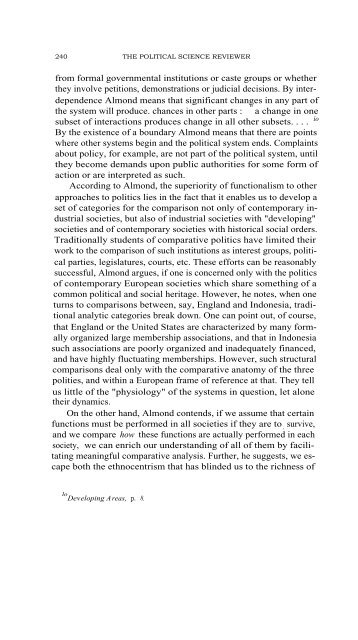FUNCTIONALISM AND ITS CRITICS - Intercollegiate Studies Institute
FUNCTIONALISM AND ITS CRITICS - Intercollegiate Studies Institute
FUNCTIONALISM AND ITS CRITICS - Intercollegiate Studies Institute
Create successful ePaper yourself
Turn your PDF publications into a flip-book with our unique Google optimized e-Paper software.
240 THE POLITICAL SCIENCE REVIEWER<br />
from formal governmental institutions or caste groups or whether<br />
they involve petitions, demonstrations or judicial decisions. By interdependence<br />
Almond means that significant changes in any part of<br />
the system will produce. chances in other parts :<br />
" a change in one<br />
subset of interactions produces change in all other subsets. . . . io<br />
By the existence of a boundary Almond means that there are points<br />
where other systems begin and the political system ends. Complaints<br />
about policy, for example, are not part of the political system, until<br />
they become demands upon public authorities for some form of<br />
action or are interpreted as such.<br />
According to Almond, the superiority of functionalism to other<br />
approaches to politics lies in the fact that it enables us to develop a<br />
set of categories for the comparison not only of contemporary industrial<br />
societies, but also of industrial societies with "developing"<br />
societies and of contemporary societies with historical social orders.<br />
Traditionally students of comparative politics have limited their<br />
work to the comparison of such institutions as interest groups, political<br />
parties, legislatures, courts, etc. These efforts can be reasonably<br />
successful, Almond argues, if one is concerned only with the politics<br />
of contemporary European societies which share something of a<br />
common political and social heritage. However, he notes, when one<br />
turns to comparisons between, say, England and Indonesia, traditional<br />
analytic categories break down. One can point out, of course,<br />
that England or the United States are characterized by many formally<br />
organized large membership associations, and that in Indonesia<br />
such associations are poorly organized and inadequately financed,<br />
and have highly fluctuating memberships. However, such structural<br />
comparisons deal only with the comparative anatomy of the three<br />
polities, and within a European frame of reference at that. They tell<br />
us little of the "physiology" of the systems in question, let alone<br />
their dynamics.<br />
On the other hand, Almond contends, if we assume that certain<br />
functions must be performed in all societies if they are to , survive,<br />
and we compare how these functions are actually performed in each<br />
society, we can enrich our understanding of all of them by facilitating<br />
meaningful comparative analysis. Further, he suggests, we escape<br />
both the ethnocentrism that has blinded us to the richness of<br />
lo Developing Areas, p. 8.
















